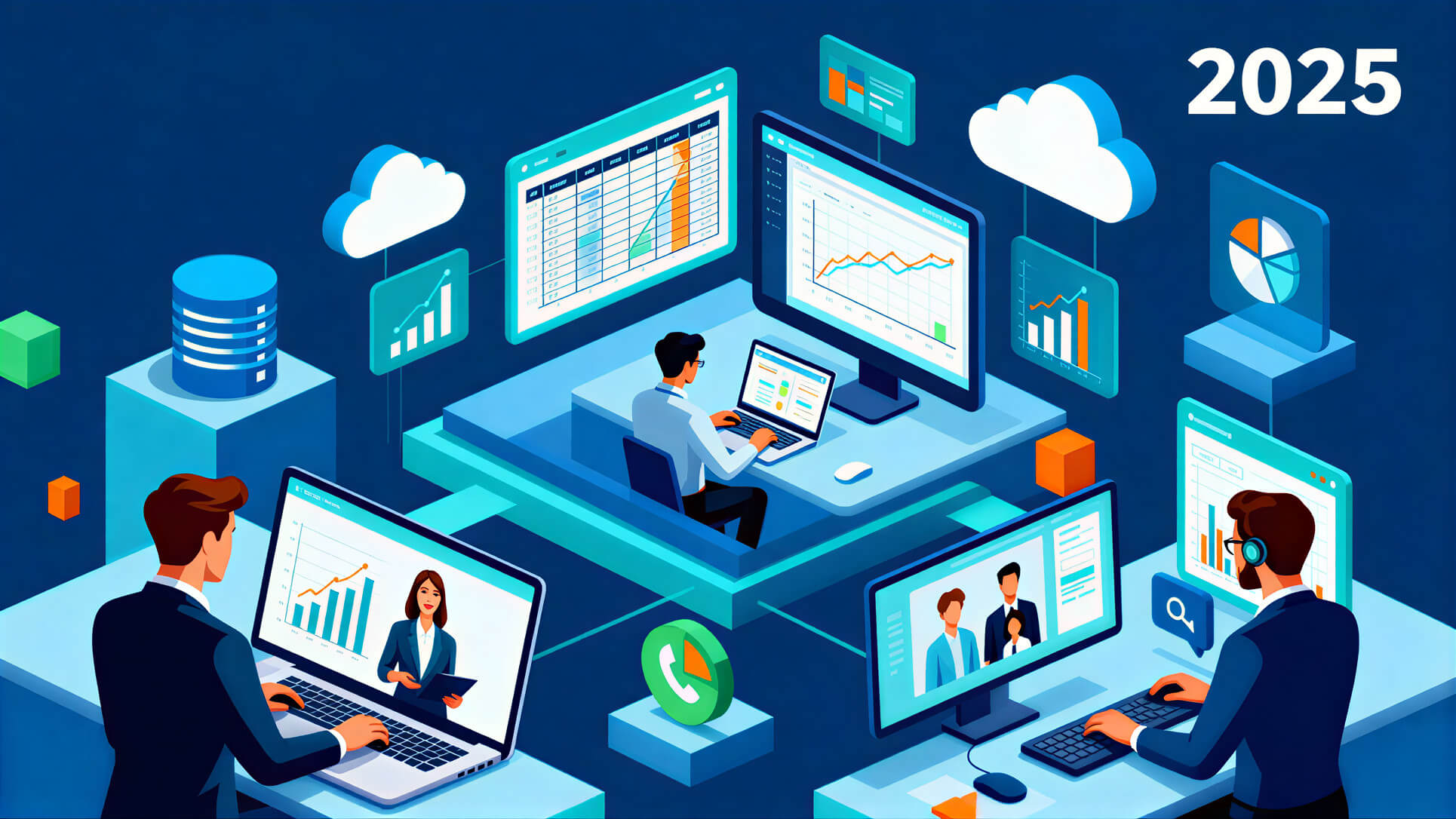AI Tools for Accounting: How VAs Use Technology to Scale Finance
Discover how accounting virtual assistants leverage AI-powered tools to transform financial operations with 90% error reduction, predictive analytics, and automated reporting capabilities.

The accounting profession has entered a new era defined by artificial intelligence and machine learning. Modern accounting virtual assistants combine traditional financial expertise with cutting-edge technology to deliver unprecedented accuracy, efficiency, and strategic insights.
According to research from MIT Sloan Management Review, automation in financial processes can reduce errors by up to 90% while freeing professionals to focus on strategic analysis. Understanding how professional virtual assistant services leverage AI integration is crucial for success in today's digital economy.
Table of Contents
- •The AI Revolution in Virtual Accounting
- •Essential Document Processing Tools
- •Financial Analysis and Reporting Platforms
- •Predictive Analytics for Strategic Planning
- •Fraud Detection with Machine Learning
- •Implementation Strategy for Success
- •Frequently Asked Questions
The AI Revolution in Virtual Accounting
Artificial intelligence has fundamentally transformed how accounting virtual assistants deliver financial services.
These technological advances enable VAs to provide enterprise-level capabilities at a fraction of traditional costs.
Core AI Applications in Financial Operations
Machine Learning and Automation
Machine learning algorithms continuously improve accuracy through pattern recognition.
Natural language processing enables automated document understanding and categorization.
Predictive analytics provide forward-looking insights from historical financial data.
Advanced Technology Integration
Computer vision technology extracts information from invoices, receipts, and financial documents.
Robotic process automation handles repetitive tasks with consistent precision.
Key Technology Components
Essential AI technologies include:
- •Optical Character Recognition (OCR): Converts physical documents to digital data
- •Machine Learning Models: Identify patterns, anomalies, and predictive trends
- •Natural Language Processing: Understands and categorizes financial transactions
- •Neural Networks: Enable complex financial forecasting and scenario analysis
Traditional vs. AI-Enhanced Workflows
Traditional bookkeeping relied heavily on manual data entry and spreadsheet analysis.
This approach consumed significant time while introducing human error risk.
According to research from the Journal of Accountancy, professionals now spend 60% less time on data entry and reconciliation.
Traditional Workflow Limitations
Manual processes had significant constraints:
- •Manual receipt processing: 15-30 minutes per document
- •Bank reconciliation: 2-4 hours per account monthly
- •Financial report preparation: 8-16 hours monthly
AI-Enhanced Workflow Advantages
Modern automation delivers dramatic improvements:
- •Automated document processing: 30 seconds per document
- •Real-time reconciliation: Continuous, automated updates
- •Instant report generation: On-demand with customizable formats
Essential Document Processing Tools
Document processing represents one of the most transformative AI applications in virtual accounting, eliminating tedious manual entry that traditionally consumed enormous professional time.
ABBYY FlexiCapture
ABBYY FlexiCapture represents the gold standard for automated invoice and receipt processing.
This sophisticated platform uses AI-powered recognition to extract data from virtually any document format with 98-99% accuracy.
Business Impact
Organizations using ABBYY FlexiCapture report processing speed increases of 400-600%.
A typical accounting VA can process 200-300 invoices daily compared to 30-40 through manual methods.
Integration Advantages
FlexiCapture provides comprehensive connectivity:
- •Seamless connection to QuickBooks, Xero, Sage platforms
- •Multi-language support for international operations
- •Mobile capture capabilities for on-the-go processing
- •Complete audit trails tracking all activities
MindBridge AI
MindBridge AI brings sophisticated artificial intelligence to risk assessment and fraud detection.
This platform analyzes 100% of transactions using ensemble AI combining multiple machine learning algorithms.
Detection Capabilities
The system identifies unusual transaction patterns, suspicious vendor relationships, and duplicate payments automatically.
According to the Association of Certified Fraud Examiners, organizations lose approximately 5% of revenue to fraud annually.
AI-powered detection tools significantly reduce this exposure.
Risk Scoring and Prioritization
Every transaction receives a risk score based on multiple factors.
Accounting VAs can focus investigation efforts on highest-risk items, optimizing time allocation.
AppZen
AppZen revolutionizes expense report management through artificial intelligence.
The platform audits 100% of expense submissions in real-time, identifying policy violations and potential fraud.
Intelligent Auditing Features
The system cross-references expense submissions against multiple data sources, verifies restaurant receipts against actual business locations, and detects duplicates and manipulated documents.
Business Results
Organizations using AppZen report 60-75% reduction in expense processing time with 300-400% improvement in fraud detection.
Financial Analysis and Reporting Platforms
Advanced AI-powered platforms transform financial analysis from a time-consuming manual process into an automated intelligence system.
Microsoft Power BI
Power BI represents Microsoft's enterprise-grade business intelligence solution with extensive AI-powered analytics capabilities at accessible price points.
AI-Enhanced Features
Natural language queries allow users to ask questions in plain English.
"What were Q4 expenses by category?" generates instant visualizations.
Automated insights identify significant trends and anomalies in financial data without manual analysis.
Integration Ecosystem
Power BI connects seamlessly with hundreds of data sources including QuickBooks, Xero, Sage, and cloud services.
Reports and dashboards share easily across organizations with automatic refresh ensuring stakeholders always view current data.
Tableau
Tableau has become synonymous with data visualization excellence.
This platform transforms complex financial data into intuitive visual representations that reveal insights instantly.
Financial Dashboard Applications
Accounting VAs build customized dashboards addressing specific business questions:
- •Cash Flow Analysis: Visual representation of cash inflows, outflows, and projections
- •Profitability Analysis: Margin analysis identifying most profitable offerings
- •Budget vs. Actual Variance: Visual identification of budget deviations
- •Key Performance Indicators: Real-time tracking of critical business metrics
Operational Intelligence
Financial data combines with operational metrics creating comprehensive business intelligence that measures campaign effectiveness and reveals true product profitability.
Predictive Analytics for Strategic Planning
Predictive analytics represents the most strategic application of AI in accounting, transforming historical financial data into forward-looking business intelligence.
IBM Watson Analytics
IBM Watson Analytics brings enterprise-level artificial intelligence to financial forecasting.
The platform uses sophisticated machine learning algorithms to identify patterns and predict future outcomes with remarkable accuracy.
Predictive Capabilities
Watson analyzes historical financial data identifying trends, seasonal fluctuations, and cyclical patterns.
Machine learning models predict future revenue, expenses, and cash flow considering multiple variables and their complex interactions.
Business Planning Applications
Cash flow forecasting becomes significantly more accurate with businesses anticipating shortfalls weeks or months in advance.
Revenue projections inform inventory decisions, staffing plans, and marketing investments.
Scenario Analysis
Watson enables sophisticated "what if" modeling.
"What if we increase marketing spend by 20%?" "How would a 10% price increase affect volume and revenue?"
Watson provides data-driven answers.
Planful
Planful specializes in financial planning, budgeting, and forecasting.
This cloud-based platform replaces static spreadsheets with dynamic, collaborative planning tools.
Planning Capabilities
Rolling forecasts update continuously based on actual performance.
Driver-based planning links operational metrics to financial outcomes where sales volume projections automatically calculate revenue and margin implications.
Collaborative Budgeting
Multiple stakeholders contribute simultaneously to budget development.
Workflow automation routes budgets through approval processes while audit trails document all changes and approvals.
Fraud Detection with Machine Learning
Machine learning has revolutionized fraud detection in accounting operations.
These AI systems identify suspicious patterns that human reviewers consistently miss.
Advanced Anomaly Detection
Modern fraud detection employs unsupervised machine learning algorithms that identify unusual patterns without pre-defining specific fraud schemes.
Pattern Recognition
Machine learning models establish normal baseline patterns for every account, vendor, and transaction type.
Deviations from these patterns trigger alerts.
The system recognizes that ABC Company typically invoices $5,000-$8,000 monthly on the 15th. A $15,000 invoice on the 3rd generates an anomaly alert.
Behavioral Analysis
Employee spending patterns establish individual baselines.
Someone who typically submits $200-$400 monthly expense reports suddenly submitting $2,000 triggers investigation.
Real-Time Transaction Monitoring
AI-powered systems monitor transactions as they occur rather than through periodic audits.
Suspicious transactions generate real-time alerts to accounting VAs for immediate investigation.
Adaptive Learning
Systems learn from false positives refining detection algorithms.
Confirmed fraud cases enhance detection models where the system recognizes similar schemes across different contexts.
Implementation Strategy for Success
Successfully integrating AI tools requires systematic approaches and proper training.
Phased Implementation Approach
Phase 1: Quick Wins (Months 1-2)
Start with document processing automation like ABBYY FlexiCapture for invoice and receipt processing.
Measure time savings and accuracy improvements.
Phase 2: Core Automation (Months 3-4)
Expand to reconciliation automation and reporting enhancements.
Deploy Power BI or Tableau for visual reporting and dashboards replacing manual reporting.
Phase 3: Advanced Analytics (Months 5-6)
Introduce predictive analytics and forecasting tools.
Deploy fraud detection systems like MindBridge for comprehensive transaction monitoring.
Training and Change Management
Technical Training
Accounting VAs require thorough training on selected tools.
Vendors typically provide implementation support and training programs.
Hands-on practice with real business data accelerates proficiency.
Process Documentation
Document new AI-enhanced workflows thoroughly.
Create step-by-step procedures for routine tasks and maintain troubleshooting guides addressing common issues.
Overcoming Common Challenges
Data Quality Issues
Conduct data cleanup before AI implementation.
Standardize vendor names, account categorizations, and transaction descriptions.
Implement strong data governance going forward.
Integration Complexity
Prioritize tools offering pre-built integrations with your accounting platform.
Consider middleware platforms like Zapier enabling connections between disparate systems.
Security and Privacy
Thoroughly vet vendors' security credentials and compliance certifications.
Verify SOC 2, ISO 27001, and relevant industry-specific certifications.
Understand data storage locations and access controls.
Frequently Asked Questions
What AI tools do accounting virtual assistants use most frequently?
Accounting VAs most commonly leverage document processing tools like ABBYY FlexiCapture for invoice automation. Financial reporting platforms including Power BI and Tableau enable sophisticated analysis. Fraud detection systems like MindBridge AI provide transaction monitoring. The specific combination depends on business needs and industry requirements.
How do AI tools reduce errors in accounting processes?
AI tools reduce errors through automated data extraction using OCR technology with 98-99% accuracy. Intelligent validation rules prevent invalid entries before they enter accounting systems. Machine learning algorithms identify anomalies suggesting errors. Research from MIT demonstrates these approaches reduce error rates by 85-95%.
What's the cost difference between traditional and AI-enhanced accounting services?
AI-enhanced accounting virtual assistants typically cost 30-50% less than traditional services. Traditional in-house accountants cost $60,000-$95,000 annually with benefits and overhead. AI-enhanced VAs charge $25-$45 per hour, costing approximately $26,000-$46,800 annually for 20 hours weekly. This economic advantage explains rapid adoption of AI-enhanced VA services.
How long does it take to implement AI accounting tools?
Simple document processing tools implement in 1-2 weeks. Mid-complexity reporting platforms take 4-8 weeks. Complex predictive analytics platforms require 8-12 weeks for full deployment. Phased implementations spread over 3-6 months provide optimal results by delivering early wins while building toward comprehensive capabilities.
Do AI accounting tools work with existing accounting software?
Most AI accounting tools integrate with major platforms including QuickBooks, Xero, Sage, FreshBooks, and NetSuite. Document processing tools connect to virtually any accounting system. Reporting platforms like Power BI and Tableau connect to hundreds of data sources with pre-built connectors for all major systems.
The integration of AI tools for accounting represents a fundamental transformation in financial management capabilities. Businesses that embrace this technology gain substantial competitive advantages through improved accuracy, enhanced efficiency, and strategic insights.
Accounting virtual assistants leveraging AI deliver enterprise-level capabilities at small business price points. Organizations partnering with experienced virtual assistant service providers accelerate their AI journey with immediate access to trained professionals using cutting-edge tools.
The future of accounting continues evolving toward greater AI integration. Businesses that embrace AI-enhanced accounting services today position themselves for success in tomorrow's increasingly digital economy.
Sources:
- •MIT Sloan Management Review - AI and Automation in Finance: https://sloanreview.mit.edu/
- •Journal of Accountancy - Accounting Technology: https://www.journalofaccountancy.com/
- •Association of Certified Fraud Examiners (ACFE) - Fraud Statistics: https://www.acfe.com/
- •American Institute of CPAs (AICPA) - Technology Trends: https://www.aicpa-cima.com/
- •Deloitte Insights - AI in Financial Services: https://www2.deloitte.com/us/en/insights/industry/financial-services.html
Author: Jennifer Martinez is a Certified Public Accountant with over 8 years of experience in virtual accounting services and financial technology implementation. She specializes in helping businesses leverage AI-powered tools to transform financial operations.
Tags:
Ready to Transform Your Business?
Don't just read about success stories—become one. Discover how Virtual Assistants can revolutionize your operations and drive sustainable growth.


